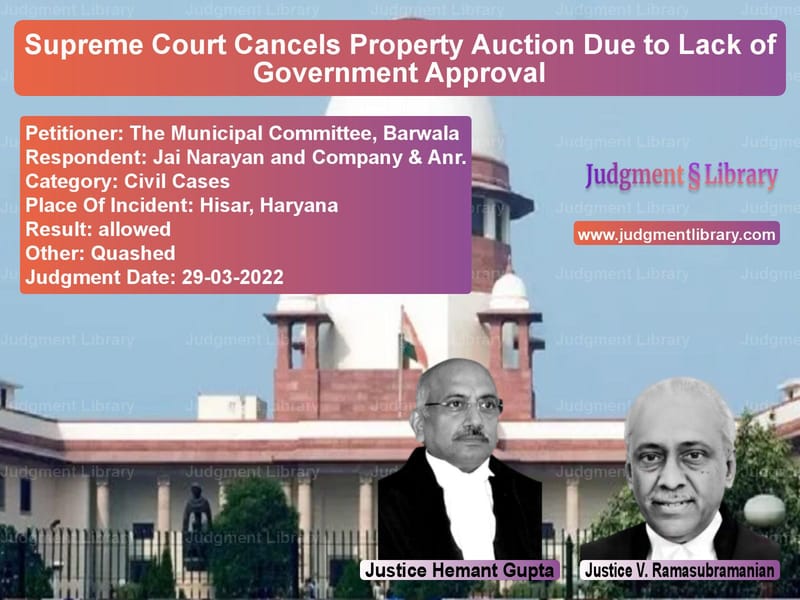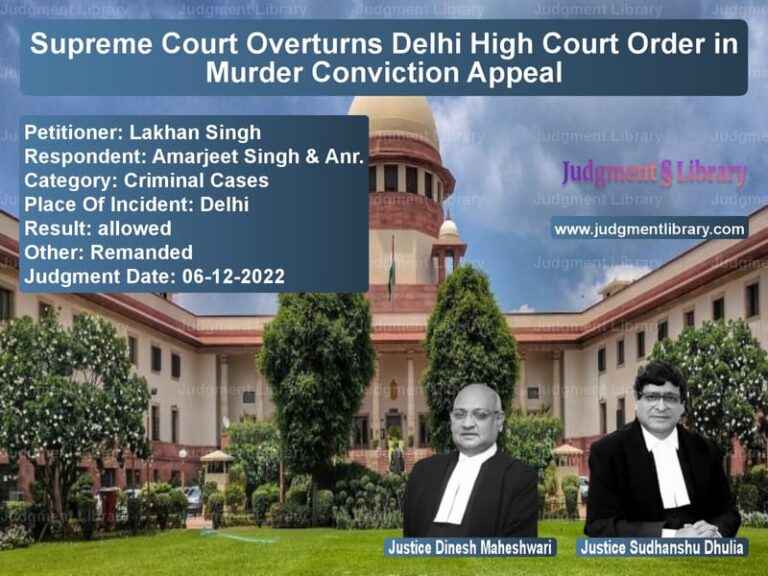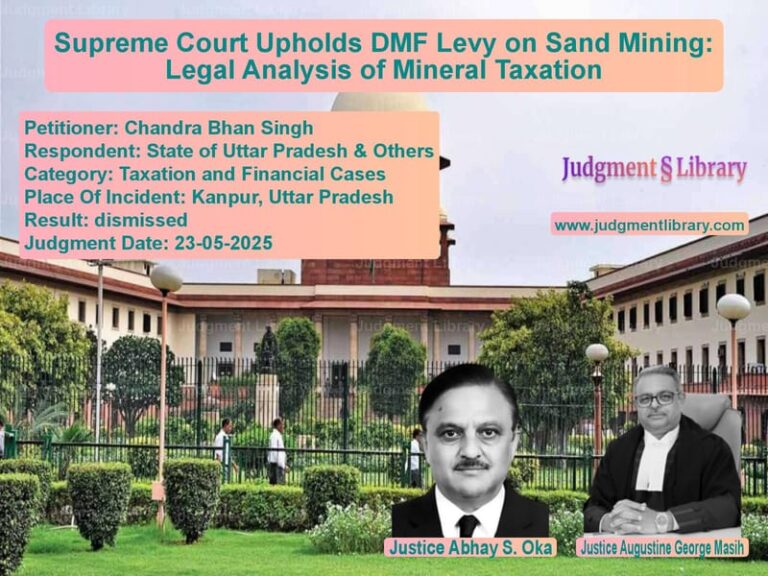Supreme Court Cancels Property Auction Due to Lack of Government Approval
The case of The Municipal Committee, Barwala vs. Jai Narayan and Company & Anr. is a landmark ruling concerning the sale of municipal land through public auction. The Supreme Court’s decision clarifies that without express government approval, no auction of municipal land can be considered legally binding, even if the highest bidder has paid the full bid amount.
This appeal was filed by the Municipal Committee, Barwala, challenging the judgment of the Punjab and Haryana High Court, which upheld the decree for mandatory injunction requiring the execution of a sale deed in favor of the highest bidder. The Supreme Court overturned the lower courts’ decisions, ruling that in the absence of state government approval, the auction did not create any legal rights in favor of the bidder.
Background of the Case
The dispute arose from an auction of municipal land measuring 55 kanals and 5 marlas, conducted by the Sub-Divisional Officer, Hisar, on March 23, 1999. The auction was conducted with prior approval from the Deputy Commissioner, and the highest bid was placed at Rs. 2,32,000 per acre, amounting to a total consideration of Rs. 15,76,150. The highest bidder, Jai Narayan and Company, deposited the full amount and claimed ownership of the land.
However, the sale deed was never executed by the Municipal Committee, leading the highest bidder to file a suit for mandatory injunction, seeking execution of the sale deed. The trial court ruled in favor of the plaintiff, and the first and second appellate courts upheld the decision. The Municipal Committee, arguing that the auction required state government approval, then approached the Supreme Court.
Arguments Presented by the Petitioner (Municipal Committee, Barwala)
The Municipal Committee contended:
- The auction required approval from the State Government, which was never granted.
- Mere participation in the auction did not confer any enforceable right to demand execution of the sale deed.
- The bidder was in unauthorized possession of the land, as the sale had never been confirmed by the government.
- Rule 2(4) of the Haryana Municipalities Management of Municipal Properties and State Properties Rules, 1976 states that no sale by auction is valid unless confirmed by the Deputy Commissioner.
- The lower courts had wrongly relied on the now-invalid Haryana Municipal Common Lands (Regulation) Act, 1974, which had been struck down by the Punjab and Haryana High Court.
Arguments Presented by the Respondent (Jai Narayan and Company)
The highest bidder, Jai Narayan and Company, argued:
- They had fully complied with the auction terms and deposited the entire sale consideration.
- The Municipal Committee had passed a resolution on May 1, 2002, approving the execution of the sale deed.
- Their possession of the land was lawful, as they had participated in a government-sanctioned auction.
- The approval from the Deputy Commissioner was sufficient to complete the transaction.
Supreme Court’s Observations and Verdict
The Supreme Court analyzed the requirements under the 1976 Rules and held that the sale could not be enforced in the absence of confirmation by the State Government. The Court made the following key observations:
- The approval of the Deputy Commissioner was only for conducting the auction, not for confirming the sale.
- Rule 2(4) of the 1976 Rules clearly states that an auction sale is not valid unless confirmed by the Deputy Commissioner.
- The communication relied upon by the respondent (Ex.P/34) was merely an inter-departmental letter requesting approval, not an actual approval order.
- The highest bidder does not automatically acquire ownership rights unless the sale is formally confirmed.
- The suit was filed more than 12 years after the auction, making it barred by limitation under Article 54 of the Limitation Act, 1963.
Based on these findings, the Supreme Court ruled:
- The appeal was allowed.
- The lower courts’ judgments granting mandatory injunction were set aside.
- The land’s possession was deemed unauthorized, and the Municipal Committee was directed to take possession.
- The amount of Rs. 15,76,150 deposited by the bidder was forfeited as damages for unauthorized occupation of the land for over 20 years.
Legal Precedents Considered
The Supreme Court referred to multiple judgments on government auctions and enforceability of public sales:
- Haryana Urban Development Authority vs. Orchid Infrastructure Developers Pvt. Ltd. (2017): Held that mere participation in an auction does not confer ownership rights.
- State of Punjab vs. Mehar Din (2022): Stated that the highest bidder in a government auction does not have an automatic right to the property unless the sale is confirmed.
- Bachhittar Singh vs. State of Punjab (1963): Clarified that internal government communications do not amount to enforceable government decisions.
Impact of the Judgment
This ruling has significant implications for government auctions and municipal property transactions:
- It establishes that government auction sales are not legally binding until formally confirmed by the competent authority.
- It prevents unauthorized occupation of public land by bidders who assume ownership without confirmation.
- It reinforces that bidders cannot claim ownership rights merely based on payment of bid amounts.
- It underscores the importance of obtaining necessary approvals before executing sale deeds in municipal land transactions.
By setting aside the lower courts’ rulings, the Supreme Court has reaffirmed the principle that public land sales require full compliance with statutory procedures before they become legally enforceable.
Read also: https://judgmentlibrary.com/supreme-court-upholds-specific-performance-in-land-sale-dispute/
Petitioner Name: The Municipal Committee, Barwala.Respondent Name: Jai Narayan and Company & Anr..Judgment By: Justice Hemant Gupta, Justice V. Ramasubramanian.Place Of Incident: Hisar, Haryana.Judgment Date: 29-03-2022.
Don’t miss out on the full details! Download the complete judgment in PDF format below and gain valuable insights instantly!
Download Judgment: the-municipal-commit-vs-jai-narayan-and-comp-supreme-court-of-india-judgment-dated-29-03-2022.pdf
Directly Download Judgment: Directly download this Judgment
See all petitions in Property Disputes
See all petitions in Specific Performance
See all petitions in Judgment by Hemant Gupta
See all petitions in Judgment by V. Ramasubramanian
See all petitions in allowed
See all petitions in Quashed
See all petitions in supreme court of India judgments March 2022
See all petitions in 2022 judgments
See all posts in Civil Cases Category
See all allowed petitions in Civil Cases Category
See all Dismissed petitions in Civil Cases Category
See all partially allowed petitions in Civil Cases Category







